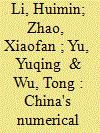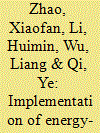|
|
|
Sort Order |
|
|
|
Items / Page
|
|
|
|
|
|
|
| Srl | Item |
| 1 |
ID:
150670


|
|
|
|
|
| Summary/Abstract |
In China, the national target for energy intensity reduction, when integrated with target disaggregation and information feedback systems, constitutes a numerical management system, which is a hallmark of modern governance. This paper points out the technical weaknesses of China's current numerical management system. In the process of target disaggregation, the national target cannot be fully disaggregated to local governments, sectors and enterprises without omissions. At the same time, governments at lower levels face pressure for reducing energy intensity that exceeds their respective jurisdictions. In the process of information feedback, information failure is inevitable due to statistical inaccuracy. Furthermore, the monitoring system is unable to correct all errors, and data verification plays a limited role in the examination system. To address these problems, we recommend that the government: use total energy consumption as the primary indicator of energy management; reform the accounting and reporting of energy statistics toward greater consistency, timeliness and transparency; clearly define the responsibility of the higher levels of government.
|
|
|
|
|
|
|
|
|
|
|
|
|
|
|
|
| 2 |
ID:
127896


|
|
|
|
|
| Publication |
2014.
|
| Summary/Abstract |
Local governments have replaced the national ministries that are in charge of various industries to become the primary implementer of energy-saving policies in China since 2000. This paper employs a case study-based approach to demonstrate the significance of local governments' policy measures in assisting industrial enterprises with energy-saving activities in China. Based on the longitudinal case of the Jasmine Thermal Electric Power Company, this paper hypothesizes that sub-national governments have played a major role in implementing energy-saving policies in China since the 11th Five-year-plan period. A wide range of provincial and municipal agencies collaborated in implementing five types of policy measures - informational policy, skill building, improved enforcement of central directives, price adjustment, and funding - that reduced barriers to energy saving and motivated active pursuit of energy-saving activities at industrial enterprises. The case study demonstrates how an enterprise and local governments work together to achieve the enterprise's energy-saving target. The authors will investigate the hypothesis of this paper in the context of multiple case studies that they plan to undertake in the future.
|
|
|
|
|
|
|
|
|
|
|
|
|
|
|
|
|
|
|
|
|